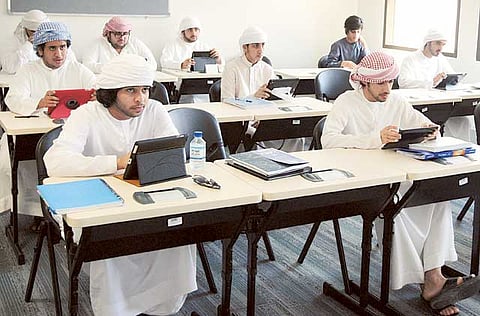The UAE has made a significant improvement in English proficiency
According to a study, educational institutions, companies and individuals are increasingly embracing English language learning

Abu Dhabi: The UAE has made significant strides in improving proficiency in English among adults, but the level of teaching English in the country is still low internationally, according to new data released by a global language training company.
According to Education First (EF), educational institutions, companies and individuals are increasingly embracing English language learning, however, many countries are failing to measure the results of their efforts.
“Although the Middle East and North Africa are the regions that are weakest in English teaching, the UAE has improved significantly this year as an exception to the region’s lackluster performance,” the EF English Proficiency Index (EF EPI), announced in the study.
EF EPI is a report that attempts to rank countries by the average level of English skills among adults. It draws its conclusions from data collected via online English tests available for free over the internet.
The UAE has succeeded in developing knowledge economies before its oil production peaks and made vital progress in its ability in English. The UAE is now ranked number one regionally and 36th internationally in English proficiency among 60 countries, EF EPI confirmed.
According to the EF EPI results announced in 2012, the UAE was ranked number 49 internationally among 54 countries worldwide in English proficiency.
Many schools now require English to be taught starting in primary school, much as they do math or science. University professors are delivering lectures in English to better prepare their students for life after graduation.
“I have seen significant progress in English education in the last six years. Students have taken the language and applied it to issues in the region. Their engagement and commitment to positive change seems to be the key to their progress in [learning] the language,” Wade J Muncil, English lecturer at Higher Colleges of Technology in Madinat Zayed and Ruwais, told Gulf News.
Muncil said that the UAE has succeeded in empowering students with education through technology.
“I think so, especially in the way of technology. The textbook is quickly becoming a thing of the past and being replaced by e-texts and students are becoming proficient in making and publishing their own iBooks,” he added.
When asked about whether there are any strategies and techniques which can be implemented to develop English education in the UAE, Muncil answered: “My suggestion is that we use the technology at hand and reach out to other domestic and international campuses to integrate projects and enhance education. “Let’s organise the skills of our students and showcase them. Our achievements are well applauded, but this is only the beginning.”
Muncil has also pointed out that the classroom is the place where the education should begin, however, it should never end there.
“This is why learning by doing (experiential learning) works so well for our students. They become the architects of their own success, take ownership of what they do and put their own personal stamp on their work,” he said.
Additionally, companies are mandating English as their corporate language. Job seekers and ambitious parents are pouring money into private English training, the report said.
A 2010 survey of 26,000 non-native English-speaking employees in international corporations, conducted by Global English, indicated that 55 per cent of employees used English every day at work. Only 4 per cent indicated that they did not use English at work at all.
“The biggest spenders on English training are not always the winners. Thus, governments, companies, parents and professionals must carefully consider the English training programme that they choose to invest in,” the EF report warned.
Sign up for the Daily Briefing
Get the latest news and updates straight to your inbox

